Fish can be a tricky thing to deal with. Even when it comes to humans eating fish, there are a lot of dos and don’ts so the same goes for dogs. You may wonder, what are the fish dogs can eat and which ones are harmful to dogs?
Fish, when prepared properly, can add a lot of great health benefits to your dog’s diet, but things can easily go wrong if everything isn’t done right.
To avoid any mishaps and find out exactly how to get the most out of the fish you feed to your dog, check out the comprehensive list below.
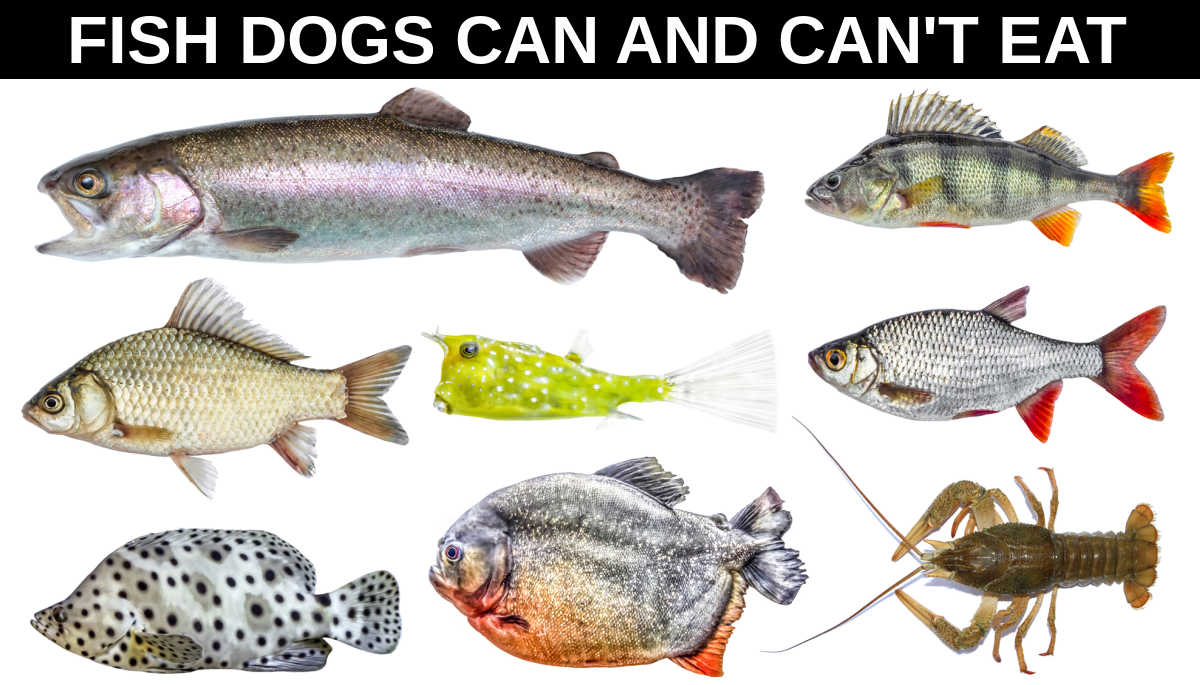
For ultimate pet safety, I recommend consulting with your vet prior to feeding your dog any food listed in this article.
- 2022 Update
- Common Questions About Dogs Eating Fish
- Specific Fish for Dogs Q&A
- Final Thoughts on Fish for Dogs
- Additional Foods Dogs Can and Can't Eat
2022 Update
Since I originally published this guide in 2019, I received lots of fantastic questions. Thank you for your feedback! I updated this guide so it is clearer and gives you scientific sources to reference as you make feeding decisions for your dogs.
We all love our dogs dearly and what we feed them can either make them stronger or might even hurt them. Fish is one of those very confusing types of food. I hope this guide gives you a clear direction so you feel safer knowing what types of fish you can feed your dog.
I updated each section and included sources for the safety or warnings that I found in my research. I hope they help you make better decisions for your dogs too.
Please remember that each dog has different digestion issues. What works for one might be harmful to another. So, speak directly to your veterinarian if you have questions about specific fish and your dog’s health.
Common Questions About Dogs Eating Fish
Can dogs eat fish?
Yes, dogs can definitely eat some types of fish. It’s actually a healthy source of protein that you will often find mixed into commercial dog food.
Along with being a great source of protein, fish is also rich in omega-3 fatty acids and can be great for dogs with specific food allergies that limit what they can eat.
In this guide, I’ll explain more about specific types of fish and dogs. Some are safer than others and some are definitely dangerous. There is so much to consider when choosing how to serve fish for dogs.
Can dogs eat canned fish?
Canned fish is fine for your dog to eat as long as you give them canned fish that isn’t packed in oil or filled with lots of added salt. You can add about a quarter of a can to your dog’s daily food to give them a boost of protein and nutrients.
There is some worry about canned tuna (and I’ll explain this again later in this article when I talk about tuna specifically). Even though canned tuna is non-toxic for dogs, the AKC said, “You shouldn’t feed your canine companion the saltwater fish because it could lead to a number of different health problems.” This is due to the high mercury content of tuna.
Can dogs eat raw fish?
There is a lot of debate in the canine community about feeding raw fish to dogs.
On one hand, The American Veterinary Medical Association does not recommend letting your dog eat raw or undercooked fish because of the risk of raw fish transmitting parasites.
Then on the other side of the coin, there are sources such as Dogs Naturally Magazine that say the fear of parasites is one you can easily ignore as long as your dog has a healthy immune system.
It all basically comes down to your dog’s current health and the state of its immune system. If your dog is frail, introducing a parasite might do more harm than good. If your dog is strong and healthy, the risk might not even worry you.
The most common parasites found in raw fish:
- Flukes
- Roundworms
- Tapeworms
The best way to decide whether to feed your dog raw fish is to ask for a health check from your veterinarian.
Can dogs eat fresh-caught raw fish?
There is some risk associated with letting your dog eat fresh-caught raw fish. All types of fish contain parasites.
If your dog is healthy and you don’t think a few parasites will harm them, then you can probably feed them fish as you catch them.
If your dog is immunocompromised or has been battling worms, then you might want to avoid letting them eat anything with parasites in them.
Can dogs eat fish bones?
Fish bones pose a risk for dogs and you’ll have to decide for yourself how dangerous that risk is for your pet.
According to the AKC, it’s best to avoid giving your dogs fish bones because “the bones can lodge themselves in your dog’s mouth, throat, stomach, and intestines, sometimes even perforating the organ wall.”
Even the AKC admits there are plenty of stories of dogs eating whole fish – bones and all – without any issues. This is a risk that you’ll have to consider for yourself.
Can dogs eat fish skin?
Fish skin is fine for dogs to eat because it is a fantastic source of Omega 3 acids. While it does provide key nutritional benefits, it is higher in fat content and can potentially contain dangerous parasites if it isn’t thoroughly cooked.
So just make sure to prepare the skin properly and make sure it’s only fed to your dog in moderation.
Can dogs eat fish sticks?
Nothing too harmful will come out of your dog eating a fish stick or two in their life, but they have no nutritional value. Giving fish sticks to your dog regularly could lead to unhealthy weight gain and future health issues down the line.
It’s best for dogs not to eat foods that are breaded.
Can dogs eat fried fish?
Avoid feeding dogs fried fish at all costs. There is no nutritional value from adding extra oils to fish in this manner and will only lessen their overall health over time.
Fried fish can lead to unhealthy weight gain. Obesity in dogs makes them at a higher risk for diabetes, heart disease, and other health issues.
Specific Fish for Dogs Q&A
Now let’s look closer at the specific types of fish you might catch or buy and how safe they are to share with your dog.
Can dogs eat carp?
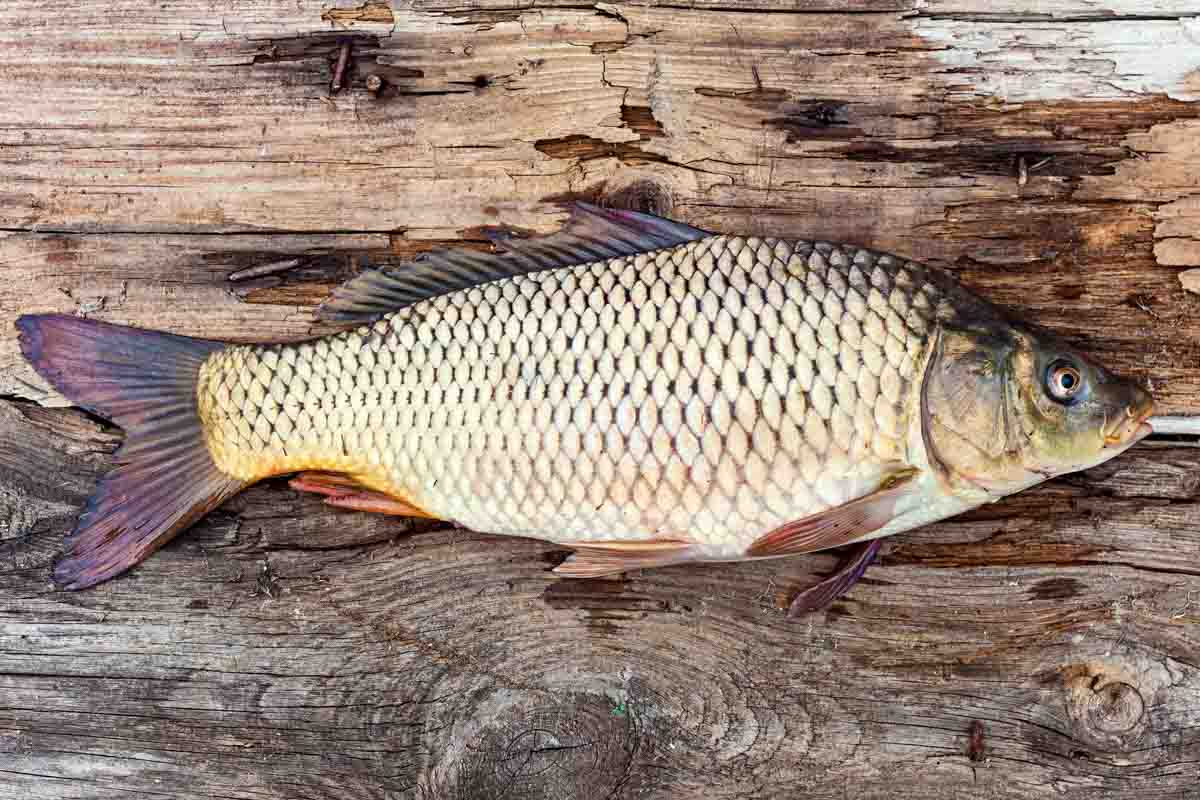
Carp is safe for dogs to eat. In fact, Asian carp has joined a growing list of protein sources for both commercial and homemade dog food.
Carp is a lean protein with omega-3 fatty acids and does not contain high mercury levels.
Can dogs eat catfish?
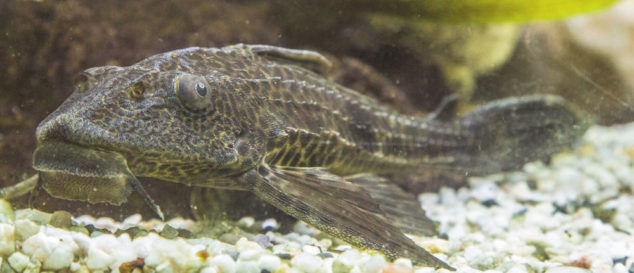
Dogs can eat catfish that is properly prepared. It’s actually the fish that is used in a lot of commercial dog foods. If you’re preparing catfish at home, just make sure to use boneless fillets.
Read more about dogs and catfish.
Can dogs eat cod?

The safety of cod for dogs is debated in the canine community. The biggest danger to cod is the industrial chemical toxins – the icky stuff that leaks into waterways from factories. The toxins fall to the bottom of the ocean, so fish that are known as bottom feeders – the ones that eat things from the bottom of the ocean – will ingest these toxins.
Cod is known as a bottom feeder. For this reason, it is a risky fish to give your dog.
Vets have been known to suggest feeding cod to your dog as a healthy treat. Just be careful with how much you feed your pet and talk to your vet about your concerns.
Can dogs eat mackerel?
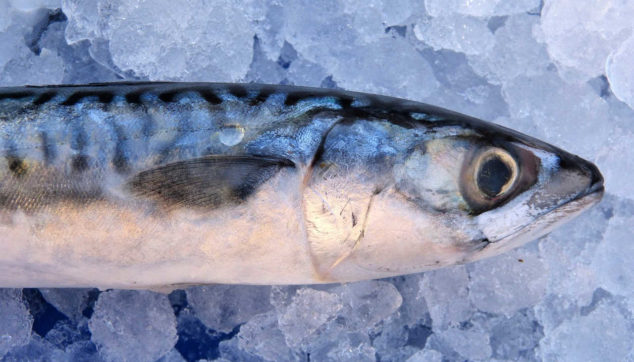
Mackerel is another fish that is a rich natural source of Omega 3 fatty acids, but certain types of mackerel are dangerous for dogs to eat. Do not let your dog eat King Mackerel or Spanish Mackerel.
According to PetMD, they are likely to have, “an accumulation of unhealthy levels of mercury in their tissues, and they often harbor parasites in their skin, muscle tissues, and internal organs.”
However, there are smaller cousins of King Mackerel that are safe for dogs to enjoy. Both Atlantic and Pacific mackerel are smaller, so they contain less mercury and are safer for dogs.
One word of caution: worldwide supply of Atlantic mackerel is declining because they are over-fished. There are more sustainable choices in this list that won’t cause the supply levels to decrease even more.
Can dogs eat orange roughy?
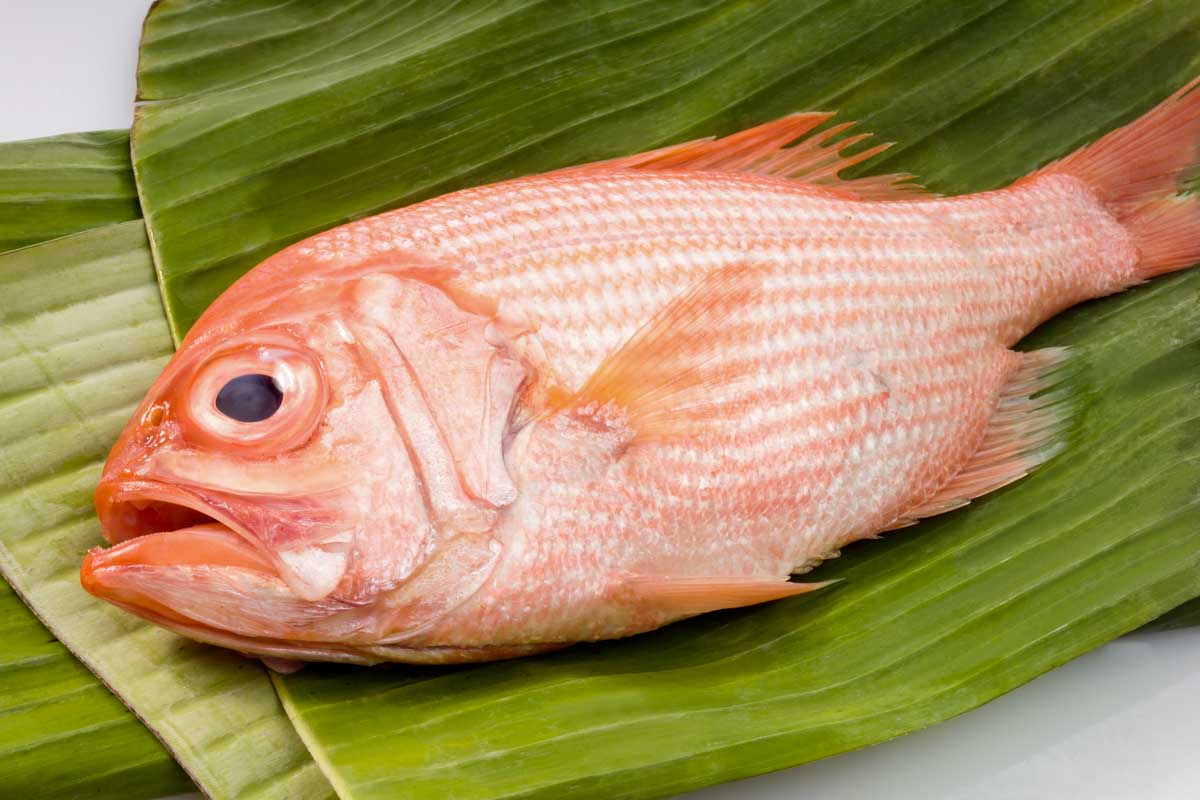
Orange roughy is also known as deep-sea carp. It lives for over 100 years. In that long lifespan, they have the potential to accumulate a lot of mercury and other toxins from the ocean it lives in.
It’s not just unsafe for your dog to eat, but humans should not eat orange roughy either.
According to the Environmental Defense Fund, orange roughy has the worst eco-rating and elevated mercury levels.
A few bites of orange roughy might not harm your dog, but the risk increases the more they eat. I recommend you play it safe and keep it away from your dog.
Can dogs eat salmon?
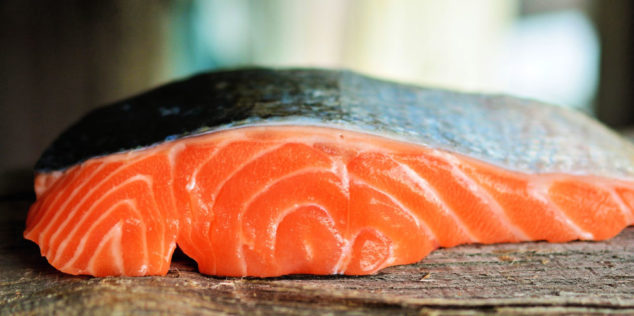
It is safe to feed cooked salmon to your dog. It can be steamed, roasted, grilled, poached, or baked without added oil or seasonings.
Salmon is another highly-debated type of fish among the dog community. There are stories of people that feed raw salmon – bones and all – to their dogs and they thrive. Then there are veterinarians warning against this habit.
Salmon (especially from the west coast) has been known to contain a parasite called Neorickettsia helminthoeca, which leads to salmon poisoning in dogs.
Signs of salmon poisoning are:
- Vomiting
- Lack of appetite
- Fever
- Diarrhea
- Weakness
- Swollen lymph nodes
- Dehydration
If you start noticing several or all of these symptoms in your dog, take him/her to the vet immediately.
Can dogs eat salmon skin?
As long as it is cooked thoroughly and without any seasonings, dogs can eat salmon skin. It contains all the healthy nutrition as salmon flesh and dogs enjoy the flavor.
Can dogs eat canned salmon?
Yes, dogs can eat canned salmon as long as it is packed in water and without any added flavorings. The bones in canned salmon are soft enough not to cause any issues.
Can dogs eat smoked salmon?
No. You should not feed your dog smoked salmon because it contains an excessive amount of salt. It can also contain harmful bacteria that cause salmon poisoning disease.
Can dogs eat sardines?
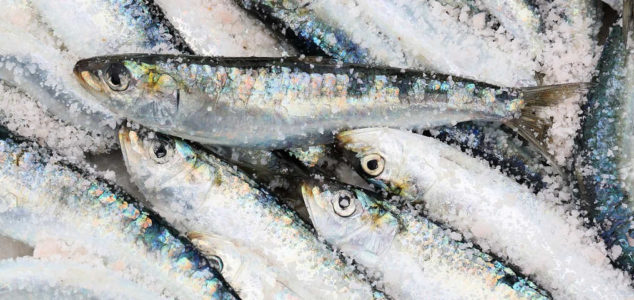
Canned sardines are fine to feed to your dog. Since they are small and low on the food chain, sardines contain minimal amounts of mercury in comparison to larger fish, making them less of a threat.
The biggest danger of canned sardines is their salt content. As long as they are not packed or canned in lots of salt, they are safe to share with your dog.
Related: Can Dogs Eat Anchovies
Can dogs eat swordfish?
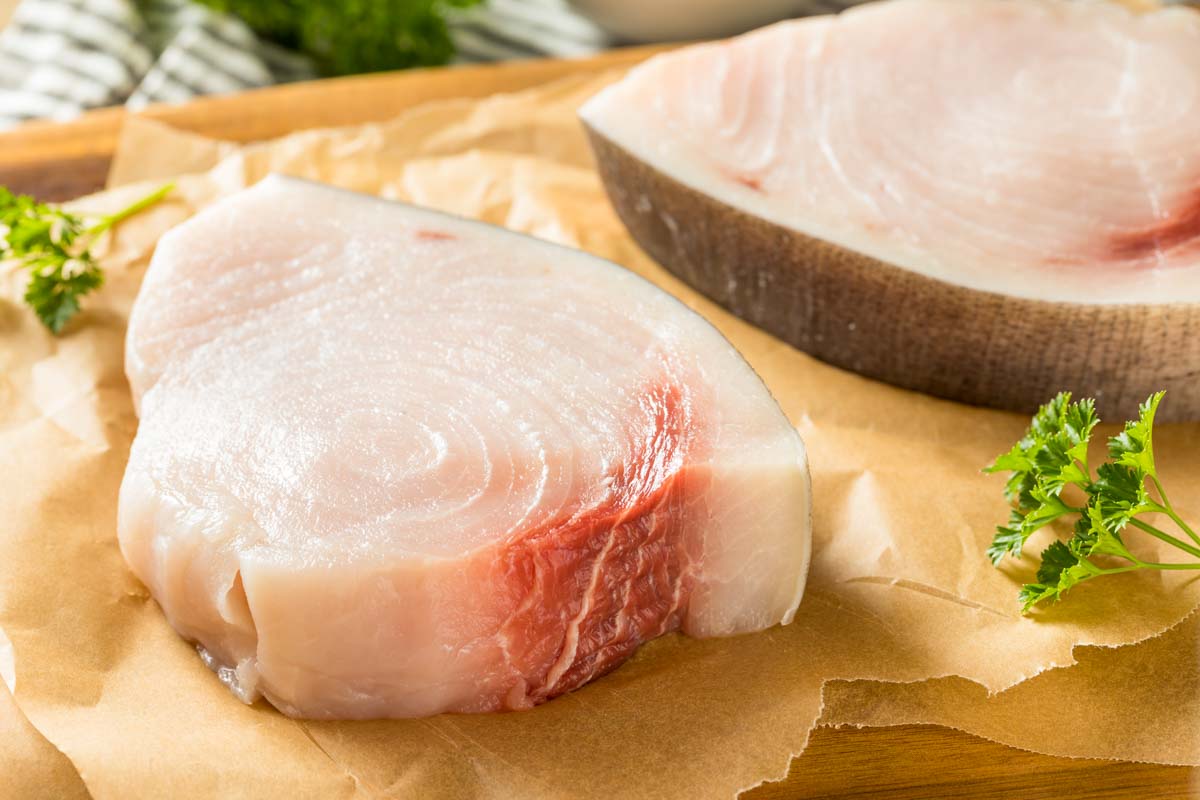
You should not let your dog eat swordfish. The Food and Drug Administration released a guideline that encourages people to avoid eating shark, swordfish, king mackerel, or tilefish because “they contain high levels of mercury.”
Can dogs eat tilapia?
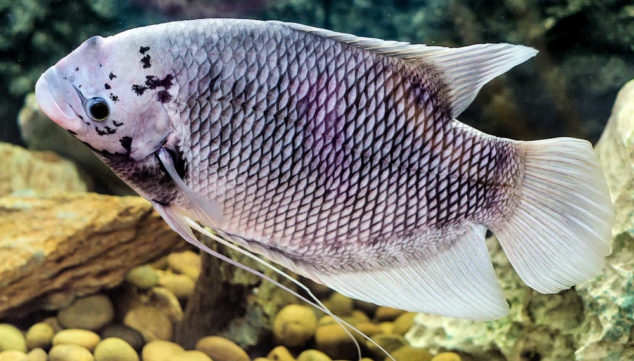
Your dog can safely eat tilapia that is not fried or cooked in rich flavorings, lots of salt, or butter like how we often enjoy tilapia for ourselves. This just means that tilapia is non-toxic.
The nutrition of tilapia varies depending on whether it is farmed or wild-caught. Farmed fish are more prone to disease or might be fed a subpar diet. Wild-caught fish thrive in their natural habitat so they are regarded as the better choices.
This is what PetMD says. “Look for brands whose labels carry the certification of either the Global Aquaculture Alliance or the Aquaculture Stewardship Council.”
Can dogs eat tuna?
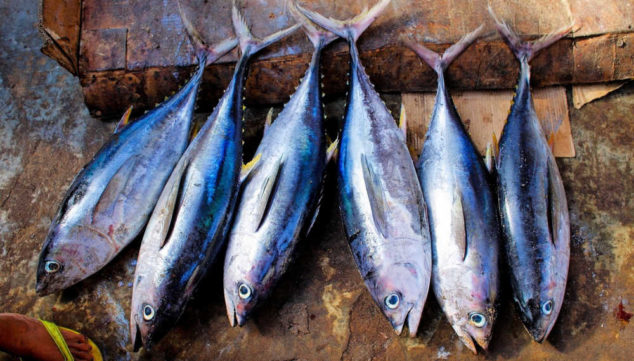
Tuna is one of the only fish on this list that is safe for dogs to consume cooked or raw. If you’re going to feed your dog raw tuna fish, make sure to remove any bones first. If it’s canned, make sure that it’s packed in water and not oil.
The only thing I want to advise is for you to consider not giving your dog canned Albacore tuna. This type of fish is usually older when they are harvested so they might have higher levels of mercury.
Can dogs eat mollusks?
Mollusks are an excellent source of protein, omega-3 fatty acids, and essential minerals like zinc, iron, and magnesium. So feel free to add some into your dog’s food bowl to sneak in a few extra key nutrients.
Can dogs eat mussels?
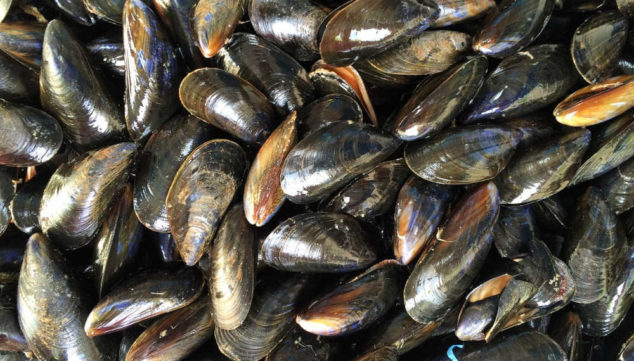
Mussels are considered to be a superfood because they contain vitamins, minerals, amino acids, antioxidants, and enzymes on top of the Omega-3s making them a great supplement to add to your dog’s diet.
Can dogs eat scallops?
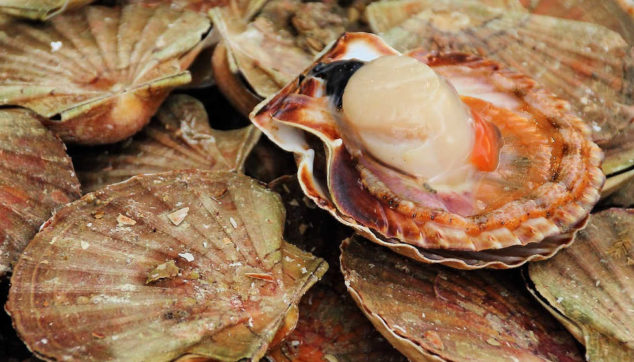
As long as you aren’t slipping your dog some of your scallop dinner that’s been fried and coated in butter, then scallops are safe for dogs to eat.
Can dogs eat oysters?
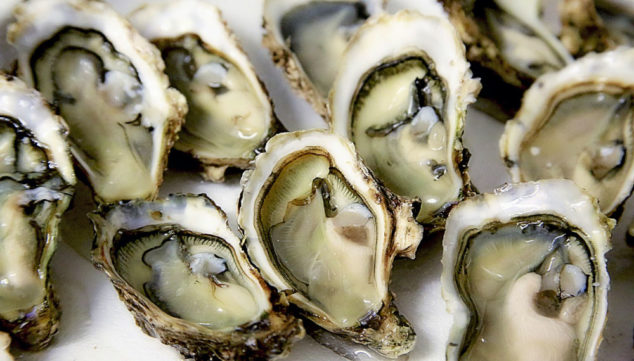
It’s a wise idea to avoid feeding oysters to your dog. The oysters may have eaten toxic algae called dinoflagellates, whose toxins concentrate in the oysters’ tissues and can cause paralytic shellfish poisoning in both humans and dogs.
Related: Can Dogs Eat Cockles
Can dogs eat shellfish?
When cooked and thoroughly cleaned of their shells, shrimps, lobsters, and crab can be eaten by dogs. Just make sure you are only giving them the meat, and the meat is fully cooked.
Can dogs eat crab?
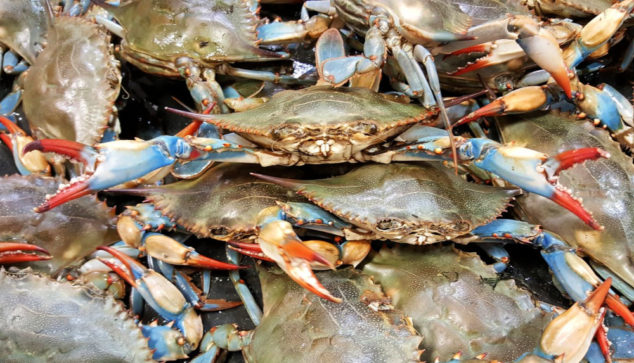
The best kind of crab for canines is the simplest dish you could ever imagine. Just steam the meat and don’t season it. The meat itself is nutritious enough, and your dog will love it as is, so no need to spice it up.
Can dogs eat crab meat?
Dogs can eat crab meat as long as you are sure your dog is not allergic. With crab, there is a bit of elevated risk, as it’s not that uncommon for dogs to be allergic to crab.
Can dogs eat lobster?
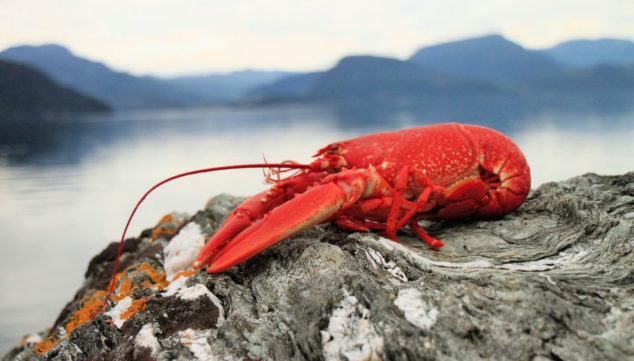
Cooked lobster is an excellent source of protein, omega-3 fatty acids, and essential minerals like zinc, phosphorus, and magnesium. So if you can swing it, feel free to treat your pup to a nice lobster dinner.
Can dogs eat shrimp and prawns?
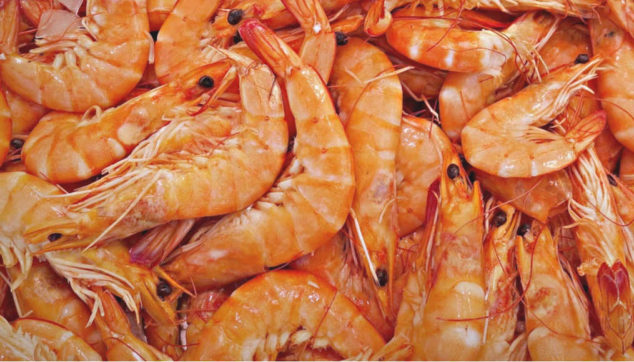
As long as the shells are removed and the prawns are cooked, they are an excellent source of protein and vitamins for your dog. The shells should be removed because the hard coating can be hazardous, especially for small dogs.
Related: Can Dogs Eat Crawfish
Can dogs eat squid and octopus?
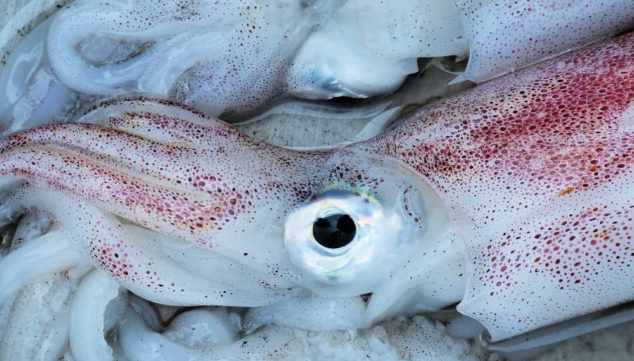
Yes, dogs can eat squid and octopus without any problems. If you have a dog that needs a very protein-rich diet, this type of fish is a good go-to.
Final Thoughts on Fish for Dogs
The basic rule to follow when it comes to feeding fish to your dog is to just be cautious and almost always cook the fish as simply as possible.
Make sure your dog doesn’t have any seafood allergies before feeding them any kind of fish.
Avoid a lot of added unnecessary calories and fats when preparing the fish. You want these to be healthy treats for your pup, not something that sends them to the vet.
Additional Foods Dogs Can and Can’t Eat
- Vegetables Dogs Can Eat
- Fruits Dogs Can Eat
- Can Dogs Have Nuts
- Can Dogs Eat Beans
- Healthy Fall Foods for Dogs
Find more information on human foods dogs can eat right here on Spoiled Hounds!
📌 Pin this to save and share 📌
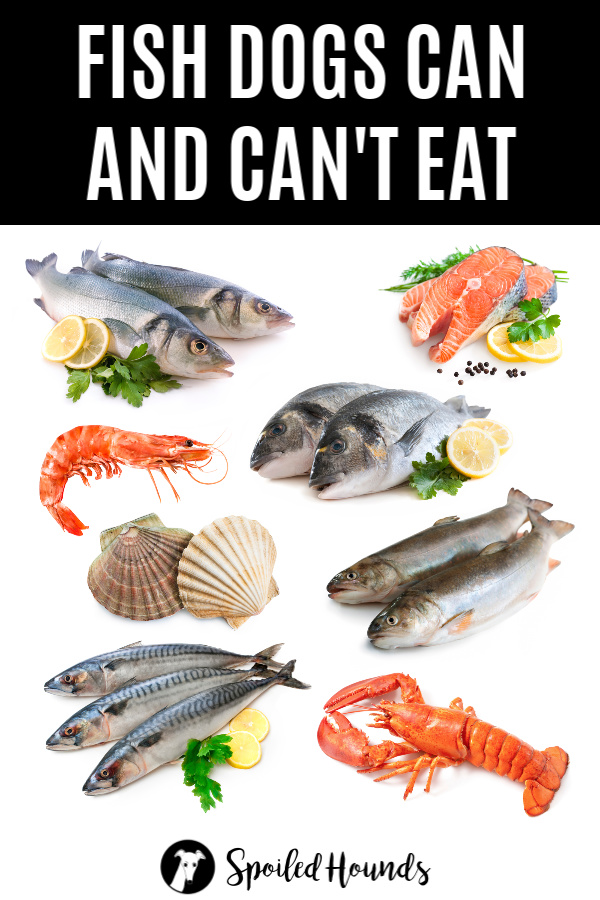
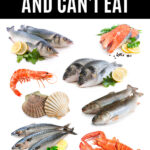
Wow. I never heard such a bunch of bunk. In Alaska & Siberia where I grew up, our sled dogs ate almost exclusively salmon & rice. We would cook it up in a big steel oil drum over a fire. During the seasonal salmon run they had enough fish that they didn’t need rice, and it was always fed to them raw and whole. During the winter, especially on the trail, we would just toss them whole frozen salmon and they would gnaw on it starting at the head until it was gone, bones fins tail & all. I never saw a dog choke on a bone and it’s considered common knowledge that raw salmon is the best diet for a dog. If you don’t feed them the bones they don’t get enough calcium, and the heads & guts have a lot of essential nutrients & vitamins for them too.
I now live in the tropics, and regularly go spear fishing to feed myself and my dog. She doesn’t much care for fresh fish, but prefers them sun-dried and extremely stinky. I leave them out in the sun on a rock for a week or two until all the maggots are gone. Again, she eats the fish whole by gnawing on it from the head down.
Alaskan raw salmon is safe for dogs. Salmon from lower latitudes can have a parasite that can have a bacteria that will kill a dog.
Thank you Spearfisher. Atleast you have some sense unlike this article. What a bunch of bull crap this whole article is. Are you kidding me, dogs eating fish bones would choke and need to see the vet immediately? Are you insane? Dogs do very well eating raw fish. And yes the whole fish head to tail. Granted there are certain types of fish that are heavier on metals that you should avoid. But there are plenty of fish in the gigantic thing we call our ocean, that dogs can have. I’ve been feeding my dogs RAW WHOLE fish their entire lives. All 3 of my dogs have amazing skin, fur, teeth, energy and have zero health problems. And it’s funny I’ve been to multiple vets that try and tell me “never feed dogs raw food”. You sound like them. Anybody who wants to feed your dog raw fish. Look else where for “real” advise. Do not listen to this article.
Re fish bones, it probably depends on multiple variables – size and hardness of the fish bone, size of the dog (ie, Zorbo the 345 lb English mastiff vs a Milly the 1 lb Chihuahua), etc. And then there’s the dog breed’s original habitat.
I appreciated the research and thought put into this post.
Greetings, I found my dog with Glenryk tin and was so furious as its said it gets sick and gets skin diease, fur falls. Is it true? Is there any treatment to prevent it from getting sick. Ive googled, well got news fish to eat or not and others. I didnt get what I needed.
Glenryk Pilchards are not harmful to dogs in small amounts. You should drain off the brine because of the high salt content. Also, note that pilchards are high in purine and can cause kidney stones if eaten often. So an occasional treat is fine. However, as I always recommend, contact your vet when your dog eats something and you are unsure if it is safe or not.
They are bred for that type of food! I was asking about a small dog that lives in a warm climate. The LAST thing I would give her is rotten fish the maggots gave up on! Especially with bones! However more power to yours if it keeps them healthy🐾🐾🌴
I’m going to start cooking food for my dog, and as I live on Cape Cod, I have access to lots of fresh fish. I’ve read a lot of fish feeding advise but still have a question. Just wondering if fish bones and cartilage can be ground up in a blender and then added to the food. And Spearfisher’s comment should be taken with a grain of salt. I’ve read enough Jack London to know that a frozen salmon is heaven to a sled dog. Feral dogs that I’ve seen in Vietnam and SE Asia eat chicken and fish bones with no problem. I think this is a genetic variation because they eat bones by necessity. If they choke, then they’re out of the gene pool. Pampered pets in the US and other western countries have to be fed more carefully.
What do you think of ground up fish bones for calcium, Renee?
Ground fish bones would be a good source of calcium. Note you want to watch the level as too much calcium can cause other issues including the formation of bladder and kidney stones.
My mom fed squid to my dog’s but the day after they started scratch their body feel so itchy and their fur begun to loss and they have some flesh wound.
It could be that your dog has an allergy to squid. I recommend you discuss this with your veterinarian.
Does anyone know if orange roughy is ok for dogs? I have a little 10 pounder and I switch between salmon, Mahe Mahe and cod.
But don’t know about orange roughy. Thank you
Orange Roughy lives for over 100 years and contains high levels of mercury. The Environmental Defense Fund has posted a health advisory on the fish. It would be best not to give it to dogs, or just give a small amount.
Is Alaskan Halibut ok to feed a dog with kidney disease?
That’s something you need to ask and discuss with your veterinarian. There are many variables and it’s best to get your vet’s advice.
No it’s not, not good for humans either, mercury content
Is Alaskan Halibut ok to feed a dog with kidney disease?
is it ok to feed my dogs baked swordfish?
As long as swordfish is baked plain then it should be okay for your dog to eat it. Note that like tuna, swordfish can have high mercury levels.
Also note that without knowing your dog’s health I cannot say for sure that it’s okay. It’s always best to discuss this with your vet.
Is Carp safe for dogs?
Yes, carp is safe for dogs to eat.
Whole carp? I’m concerned about those huge scales.
It would be best to remove the scales since they can be a choking hazard and are difficult to digest.
Most mackerel is perfectly safe for dogs!
This article is confusing the different types of mackerel which vary quite a lot in mercury. Atlantic Mackerel and Pacific/Chub Mackerel have very low mercury levels and remarkably high omega-3 content; these types of mackerel are very safe and healthy for dogs to eat!
SAFE Mackerel types:
– Atlantic Mackerel: VERY LOW mercury
– Pacific Mackerel (Chub): LOW mercury
UNSAFE Mackerel types:
– Spanish Mackerel: HIGH mercury
– King Mackerel: VERY HIGH mercury
Please update this article to reflect this information which is readily available from the FDA and other seafood resources.
Cheers!
Jack – thank you for the information on mackerel. I will look into it and update the article accordingly.
What is the safety of orange roughy for dogs? I switch between salmon, Mahe Mahe, and cod and I have a little 10 pounder.
The orange roughy is unknown to me. I appreciate your help
Orange Roughy is not safe for dogs. It can contain high levels of mercury.
Mahi mahi is also a high Mercury fish!
I feed my French bulldog on Raw diet.
I buy a free range human consumable complete. One of the flavours sold by my supplier is a Duck and
Atlantic MSC Salmon. There is 35-40 %
As per your advisory Salmon is only to be fed to a dog cooked.
If I give my dog this particular product can he become ill?
Thanks
Dawn, Sacha and Bumble
Yes, there is potential for your dog becoming ill from eating raw salmon. I recommend for you to discuss this particular food with your veterinarian.
Most of the treats we give to our dog have salmon flavor and he loves them, but our previous dog didn’t even consider eating Salmon treats.
Is grouper ok to feed my pups?
Grouper may cause ciguatera poisoning due to toxins from algae the fish may have eaten. It is advisable to avoid feeding grouper to dogs.
I just bought from the supermarket fresh white bait fish and mussels from a mussel farm ,I want to steam them one of my dogs has cushing disease is this OK for him to eat
Please discuss this with your vet. Since your dog has a medical condition, your vet is the best one to give advice on what your dog can and can’t eat.
Your article provides an excellent and thorough guide for dog owners on the intricacies of feeding fish to their canine companions. As a pet care enthusiast, I found the information detailed and well-researched, making it a valuable resource for dog owners seeking clarity on this topic.
I appreciate the comprehensive approach you’ve taken, addressing common questions about dogs eating fish, including considerations about canned fish, raw fish, fish bones, fish skin, and various types of fish.